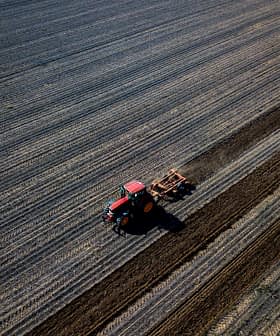The Italian Parliament has passed a new law to increase the number of young farmers in the country.
This legislation provides funding and initiatives to address the generational gap in agriculture by supporting companies with new ideas and technologies and prioritizing innovative entrepreneurial skills.
The law seeks to facilitate the expansion of existing ventures and the creation of new ones by farmers under the age of 41.
See Also:New Law in Italy Establishes Role of Farmers in Protecting EnvironmentIf cooperatives are interested in initiatives related to this law, they will qualify for the new funds only if at least half of their members are younger than 41.
While a significant portion of Italian agricultural companies also engage in other sectors, this law will exclusively support entities that primarily focus on agriculture.
In the final approved text, the total funds allocated by the law have been adjusted from the initially proposed €100 million to €15 million per annum between 2024 and 2029.
These funds will co-finance development programs proposed by regional authorities throughout the country, including the acquisition of farmland and agricultural equipment.
Additionally, the law reduces the legal and bureaucratic expenses associated with land purchases by 50 percent.
Projects that incorporate technological upgrades and product innovation strategies will be prioritized. Adopting best agricultural practices, particularly precision agriculture, will also be prioritized.
The law will encourage a range of new initiatives within the community organized by local authorities, such as workshops, seminars and the participation of new young farmers in agricultural fairs and events.
The law will also introduce a favorable tax regime for new farming companies and those expanding.
Under this law, a new National Observatory for Youth Entrepreneurship and Employment in Agriculture (Onilga) will also be established.
This body will include experts from several ministries, farming associations and specialized organizations such as the Institute for Services to the Agricultural Market (Ismea) and the Council for Research in Agriculture and Analysis of the Agri-Economy (Crea).
This law is the latest effort in a long-fought struggle against the prevalent issue of an aging farming population in Italy.
According to the most recent General Census of Agriculture published in 2022 by the National Institute of Statistics (Istat), the number of agricultural companies led by young people fell from 11.5 percent in 2010 to 9.3 percent in 2020.
The majority of the remaining companies are often managed by farmers over the age of 65. In 2021, Ismea reported that in Italy, there are 11 farmers over the age of 65 for each farmer under the age of 40.
The Istat Census revealed a total of 1.13 million agricultural entities in the country in 2020, with only 104,886 led by entrepreneurs under 40.
Regarding the olive oil sector, Ismea reported in 2021 that only 4.6 percent of the specialized olive farming companies are led by farmers under 40, much lower than the 7.9 percent reported for the entire Italian agricultural sector.
Istat noted that younger farmers are more likely to adopt the latest technologies and engage in organic farming, making their enterprises more competitive in the market.
These companies are typically larger than average, operate on leased land and are significantly more digitalized and innovative than those led by older generations.









